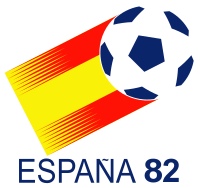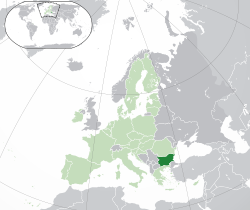|
Bulgaria
1982 World Cup, Spain
1975 Proof Silver 10 Leva 37mm (18.60 grams) 0.640 Silver (0.3035 oz. ASW)
Reference: KM# 144 | Engraver: P. Georgiev
НАРОДНА РЕПУБЛИКА БЪЛГАРИЯ 19 82 10 ЛЕВА, Coat-of-arms of People’s Republic of
Bulgaria.
ХII СВЕТОВНО ПЪРВЕНСТВО ПО ФУТБОЛ ИСПАНИЯ – 1982, Footballers, soccer players
attack ball.
You are bidding on the exact item pictured, provided with a Certificate of Authenticity and Lifetime Guarantee of Authenticity.
 The 1982 FIFA World Cup was the 12th FIFA World Cup, a quadrennial football tournament for men’s senior national teams, and was played in Spain between 13 June and 11 July 1982. The tournament was won by Italy, who defeated West Germany 3–1 in the final, held in the Santiago Bernabéu Stadium in the Spanish capital of Madrid. It was Italy’s third World Cup title, but their first since 1938. The defending champions, Argentina, were eliminated in the second round (finishing third and last in their group). Algeria, Cameroon, Honduras, Kuwait and New Zealand made their first appearances in the finals. The 1982 FIFA World Cup was the 12th FIFA World Cup, a quadrennial football tournament for men’s senior national teams, and was played in Spain between 13 June and 11 July 1982. The tournament was won by Italy, who defeated West Germany 3–1 in the final, held in the Santiago Bernabéu Stadium in the Spanish capital of Madrid. It was Italy’s third World Cup title, but their first since 1938. The defending champions, Argentina, were eliminated in the second round (finishing third and last in their group). Algeria, Cameroon, Honduras, Kuwait and New Zealand made their first appearances in the finals.
The tournament featured the first penalty shoot-out in World Cup competition. This was the last World Cup to feature two rounds of group stages. It was also the third time (after 1934 and 1966) in which all four semi-finalists were European.
In the first round of Group 3, Hungary defeated El Salvador 10–1, equalling the largest margin of victory recorded in the finals (Hungary over South Korea 9–0 in 1954, and Yugoslavia over Zaire 9–0 in 1974).
 Bulgaria (Bulgarian: България, tr. Bǎlgariya), officially the Republic of Bulgaria (Bulgarian: Република България, tr. Republika Bǎlgariya, IPA: [rɛˈpublikɐ bɐɫˈɡarijɐ]), is a country in southeastern Europe. It is bordered by Romania to the north, Serbia and Macedonia to the west, Greece and Turkey to the south, and the Black Sea to the east. With a territory of 110,994 square kilometres (42,855 sq mi), Bulgaria is Europe’s 16th-largest country. Bulgaria (Bulgarian: България, tr. Bǎlgariya), officially the Republic of Bulgaria (Bulgarian: Република България, tr. Republika Bǎlgariya, IPA: [rɛˈpublikɐ bɐɫˈɡarijɐ]), is a country in southeastern Europe. It is bordered by Romania to the north, Serbia and Macedonia to the west, Greece and Turkey to the south, and the Black Sea to the east. With a territory of 110,994 square kilometres (42,855 sq mi), Bulgaria is Europe’s 16th-largest country.
 Organised prehistoric cultures began developing on current Bulgarian lands during the Neolithic period. Its ancient history saw the presence of the Thracians, Ancient Greeks, Persians, Celts, Romans, Goths, Alans and Huns. The emergence of a unified Bulgarian state dates back to the establishment of the First Bulgarian Empire in 681 AD, which dominated most of the Balkans and functioned as a cultural hub for Slavs during the Middle Ages. With the downfall of the Second Bulgarian Empire in 1396, its territories came under Ottoman rule for nearly five centuries. The Russo-Turkish War of 1877-78 led to the formation of the Third Bulgarian State. The following years saw several conflicts with its neighbours, which prompted Bulgaria to align with Germany in both world wars. In 1946 it became a one-party socialist state as part of the Soviet-led Eastern Bloc. In December 1989 the ruling Communist Party allowed multi-party elections, which subsequently led to Bulgaria’s transition into a democracy and a market-based economy. Organised prehistoric cultures began developing on current Bulgarian lands during the Neolithic period. Its ancient history saw the presence of the Thracians, Ancient Greeks, Persians, Celts, Romans, Goths, Alans and Huns. The emergence of a unified Bulgarian state dates back to the establishment of the First Bulgarian Empire in 681 AD, which dominated most of the Balkans and functioned as a cultural hub for Slavs during the Middle Ages. With the downfall of the Second Bulgarian Empire in 1396, its territories came under Ottoman rule for nearly five centuries. The Russo-Turkish War of 1877-78 led to the formation of the Third Bulgarian State. The following years saw several conflicts with its neighbours, which prompted Bulgaria to align with Germany in both world wars. In 1946 it became a one-party socialist state as part of the Soviet-led Eastern Bloc. In December 1989 the ruling Communist Party allowed multi-party elections, which subsequently led to Bulgaria’s transition into a democracy and a market-based economy.

Bulgaria’s population of 7.2 million people is predominantly urbanised and mainly concentrated in the administrative centres of its 28 provinces. Most commercial and cultural activities are centred on the capital and largest city, Sofia. The strongest sectors of the economy are heavy industry, power engineering, and agriculture, all of which rely on local natural resources.
The country’s current political structure dates to the adoption of a democratic constitution in 1991. Bulgaria is a unitary parliamentary republic with a high degree of political, administrative, and economic centralisation. It is a member of the European Union, NATO, and the Council of Europe; a founding state of the Organization for Security and Co-operation in Europe (OSCE); and has taken a seat at the UN Security Council three times.
|





 The 1982 FIFA World Cup was the 12th FIFA World Cup, a quadrennial football tournament for men’s senior national teams, and was played in Spain between 13 June and 11 July 1982. The tournament was won by Italy, who defeated West Germany 3–1 in the final, held in the Santiago Bernabéu Stadium in the Spanish capital of Madrid. It was Italy’s third World Cup title, but their first since 1938. The defending champions, Argentina, were eliminated in the second round (finishing third and last in their group). Algeria, Cameroon, Honduras, Kuwait and New Zealand made their first appearances in the finals.
The 1982 FIFA World Cup was the 12th FIFA World Cup, a quadrennial football tournament for men’s senior national teams, and was played in Spain between 13 June and 11 July 1982. The tournament was won by Italy, who defeated West Germany 3–1 in the final, held in the Santiago Bernabéu Stadium in the Spanish capital of Madrid. It was Italy’s third World Cup title, but their first since 1938. The defending champions, Argentina, were eliminated in the second round (finishing third and last in their group). Algeria, Cameroon, Honduras, Kuwait and New Zealand made their first appearances in the finals. Bulgaria (Bulgarian: България, tr. Bǎlgariya), officially the Republic of Bulgaria (Bulgarian: Република България, tr. Republika Bǎlgariya, IPA: [rɛˈpublikɐ bɐɫˈɡarijɐ]), is a country in southeastern Europe. It is bordered by Romania to the north, Serbia and Macedonia to the west, Greece and Turkey to the south, and the Black Sea to the east. With a territory of 110,994 square kilometres (42,855 sq mi), Bulgaria is Europe’s 16th-largest country.
Bulgaria (Bulgarian: България, tr. Bǎlgariya), officially the Republic of Bulgaria (Bulgarian: Република България, tr. Republika Bǎlgariya, IPA: [rɛˈpublikɐ bɐɫˈɡarijɐ]), is a country in southeastern Europe. It is bordered by Romania to the north, Serbia and Macedonia to the west, Greece and Turkey to the south, and the Black Sea to the east. With a territory of 110,994 square kilometres (42,855 sq mi), Bulgaria is Europe’s 16th-largest country. Organised prehistoric cultures began developing on current Bulgarian lands during the Neolithic period. Its ancient history saw the presence of the Thracians, Ancient Greeks, Persians, Celts, Romans, Goths, Alans and Huns. The emergence of a unified Bulgarian state dates back to the establishment of the First Bulgarian Empire in 681 AD, which dominated most of the Balkans and functioned as a cultural hub for Slavs during the Middle Ages. With the downfall of the Second Bulgarian Empire in 1396, its territories came under Ottoman rule for nearly five centuries. The Russo-Turkish War of 1877-78 led to the formation of the Third Bulgarian State. The following years saw several conflicts with its neighbours, which prompted Bulgaria to align with Germany in both world wars. In 1946 it became a one-party socialist state as part of the Soviet-led Eastern Bloc. In December 1989 the ruling Communist Party allowed multi-party elections, which subsequently led to Bulgaria’s transition into a democracy and a market-based economy.
Organised prehistoric cultures began developing on current Bulgarian lands during the Neolithic period. Its ancient history saw the presence of the Thracians, Ancient Greeks, Persians, Celts, Romans, Goths, Alans and Huns. The emergence of a unified Bulgarian state dates back to the establishment of the First Bulgarian Empire in 681 AD, which dominated most of the Balkans and functioned as a cultural hub for Slavs during the Middle Ages. With the downfall of the Second Bulgarian Empire in 1396, its territories came under Ottoman rule for nearly five centuries. The Russo-Turkish War of 1877-78 led to the formation of the Third Bulgarian State. The following years saw several conflicts with its neighbours, which prompted Bulgaria to align with Germany in both world wars. In 1946 it became a one-party socialist state as part of the Soviet-led Eastern Bloc. In December 1989 the ruling Communist Party allowed multi-party elections, which subsequently led to Bulgaria’s transition into a democracy and a market-based economy.





